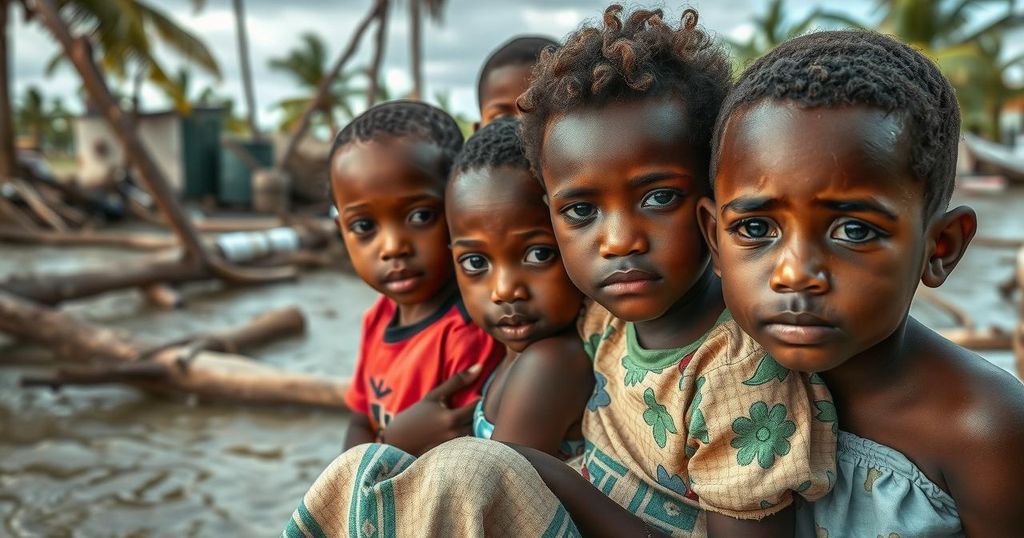Cyclone Chido Leaves 90,000 Children Affected in Mozambique
Tropical Cyclone Chido has severely impacted northern Mozambique, affecting nearly 90,000 children with over 35,000 homes destroyed. The storm exacerbates existing crises, as the region already struggles with conflict and disease. Immediate humanitarian aid is needed, with ongoing assessments revealing that approximately 190,000 people require urgent assistance. The UN is responding but faces challenges due to limited supplies.
Tropical Cyclone Chido wreaked havoc in northern Mozambique, significantly affecting the Cabo Delgado province. Current reports estimate that nearly 90,000 children are among those impacted, with extensive damage to over 35,000 homes. This disaster has compounded the existing hardships in a region already grappling with ongoing conflict, disease outbreaks, and harsh weather conditions. Additionally, at least 186,000 classrooms were destroyed, hampering educational initiatives and further straining the community’s resilience.
The cyclone’s impact extends beyond Cabo Delgado, affecting areas in Nampula and Niassa provinces. Reports indicate that the storm has left over 25,000 families without electricity and posed a significant risk to water supply facilities. The potential for worsening public health scenarios, particularly in the wake of a cholera outbreak, is alarming. The World Health Organization has deployed experts to assess health needs and facilitate necessary interventions.
The plight of displaced families in Cabo Delgado is dire, as many have lost nearly everything they had managed to rebuild after years of internal conflict. The UN Refugee Agency has already responded by providing emergency aid to those in need, with over 2,600 individuals receiving essential supplies. Preliminary assessments reveal that approximately 190,000 people urgently require humanitarian assistance, amid fears that access to basic services will deteriorate further.
UN Secretary-General António Guterres has affirmed that UN teams are mobilizing support and assistance to the affected populations. However, the response is hindered by limited resources, despite an initial allocation of $4 million for early humanitarian efforts. The World Food Programme is also planning to escalate operations to address the increasing food insecurity among the affected populations, with projections indicating that almost 3.3 million people will face food crises in the upcoming year.
Cyclone Chido is part of a series of climate-related disasters that Mozambique has endured, marking the country as one of the most affected by climate change. The area of Cabo Delgado has already suffered from prolonged conflict, leaving millions displaced and vulnerable. Storms like Chido disrupt not only infrastructure but also vital services such as education and healthcare, exacerbating existing humanitarian crises in the region and highlighting the need for effective disaster preparedness and response strategies in Mozambique.
In summary, Cyclone Chido has had a catastrophic impact on northern Mozambique, particularly on children and vulnerable families. The extensive destruction of homes, schools, and healthcare facilities underscores the urgent need for humanitarian assistance in the aftermath of this disaster. The international community, alongside local agencies, must work collaboratively to provide immediate support and resources to those in need amidst the ongoing challenges posed by conflict and climate change.
Original Source: news.un.org




Post Comment